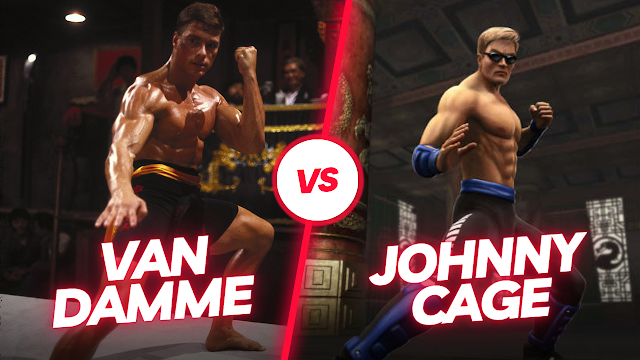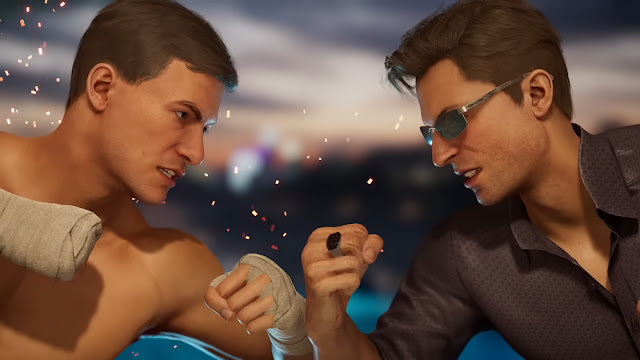Van Damme vs Johnny Cage: Uncovering Mortal Kombat's Evolution from Bloodsport
In the pantheon of martial arts entertainment, few franchises have achieved the iconic status of Mortal Kombat. Known for its visceral combat, rich lore, and unforgettable characters, Mortal Kombat has captivated audiences for decades. Yet, beneath its surface lies a fascinating connection to the cult classic film Bloodsport, particularly embodied in the characters of Jean-Claude Van Damme and Johnny Cage. This article delves into the deep-rooted ties between these two martial arts phenomena, exploring how Bloodsport and Van Damme's portrayal of Frank Dux served as a cornerstone for Mortal Kombat's inception and evolution.

The Genesis of Mortal Kombat: A Tribute to Bloodsport
Released in 1988, Bloodsport starred Jean-Claude Van Damme as Frank Dux, a martial artist competing in an underground fighting tournament known as the Kumite. The film's gripping narrative and intense fight scenes quickly garnered a cult following, solidifying Van Damme as a martial arts icon. This cinematic masterpiece didn't just entertain; it laid the groundwork for what would become one of the most beloved fighting game franchises of all time.
Mortal Kombat, created by Ed Boon and John Tobias, debuted in 1992. The game's concept drew heavily from the martial arts cinema that had captivated audiences in the 1980s, with Bloodsport standing out as a primary influence. The idea of a secretive, deadly tournament featuring warriors from diverse backgrounds resonated with the developers, who sought to bring that cinematic excitement to the gaming world.
Johnny Cage: The Digital Doppelgänger
Among Mortal Kombat's original characters, Johnny Cage stands as a direct homage to Jean-Claude Van Damme's on-screen persona. Cage, portrayed as a Hollywood action star with a penchant for martial arts, mirrors Van Damme's flamboyant fighting style and cinematic bravado. With his signature "Shadow Kick" and the iconic split punch maneuver—both reminiscent of Van Damme's fighting techniques—Johnny Cage channels the essence of the silver screen martial artist.
Initially, Van Damme was approached to be part of the Mortal Kombat project, potentially as the face of Johnny Cage. Although the collaboration didn't materialize, Cage's character retained many attributes inspired by Van Damme, from his flashy moves to his Hollywood backstory. This tribute ensured that the spirit of Van Damme's martial arts mastery lived on within the Mortal Kombat universe.
The Evolution of Johnny Cage
While Johnny Cage began as a tribute to Van Damme, his character evolved into a multi-dimensional figure with depth and complexity. Over the years, Cage's storyline expanded, revealing layers of personality beyond his initial Hollywood bravado. He became a beloved character not just for his fighting skills, but also for his humor, loyalty, and growth as a person and a warrior.
Despite this evolution, the spirit of Van Damme's portrayal continues to resonate through Johnny Cage. The character's journey from a self-absorbed movie star to a dedicated fighter and protector mirrors the kind of character development seen in many martial arts films, including those featuring Van Damme. This ongoing homage serves as a reminder of the enduring influence of martial arts cinema on the gaming world.
Mortal Kombat's Cinematic Inspirations
Beyond Johnny Cage, Mortal Kombat features a diverse cast of characters inspired by martial arts cinema. Characters like Liu Kang, Sub-Zero, and Scorpion draw from a rich tapestry of martial arts traditions and cinematic influences. Liu Kang, for example, is modeled after Bruce Lee, another legendary martial artist whose impact on cinema and pop culture is immeasurable.
This fusion of cinematic influences with gaming innovation has propelled Mortal Kombat to the forefront of pop culture. The franchise's ability to blend the excitement and drama of martial arts films with the interactive nature of video games has captivated audiences worldwide. Each character, with their unique backstory and fighting style, contributes to a dynamic and immersive universe that continues to evolve with each installment.
The Impact of Bloodsport on Gaming Culture
The symbiotic relationship between Mortal Kombat and Bloodsport underscores the profound impact of martial arts cinema on gaming culture. Bloodsport introduced audiences to the thrilling world of underground fighting tournaments, a concept that Mortal Kombat expanded upon with its fantastical elements and diverse roster of fighters. The film's influence is evident in the game's structure, themes, and character archetypes.
Jean-Claude Van Damme's role in Bloodsport not only inspired Johnny Cage but also set a precedent for how martial artists could be portrayed in games. His athleticism, charisma, and fighting prowess became benchmarks for character design in fighting games. As a result, Mortal Kombat's characters, while varied in their origins and abilities, share a common thread of dynamic martial artistry that traces back to Van Damme's cinematic legacy.
Mortal Kombat: A Cultural Phenomenon
Since its inception, Mortal Kombat has grown into a cultural phenomenon, spawning movies, TV series, comics, and an extensive merchandise line. The franchise's impact extends beyond gaming, influencing pop culture at large. Its signature fatalities, catchphrases, and characters have become iconic, embedding themselves in the collective consciousness of fans worldwide.
Mortal Kombat's success can be attributed to its ability to evolve while staying true to its roots. Each new game introduces fresh characters and storylines, yet the core elements—intense combat, rich mythology, and homage to martial arts cinema—remain constant. This balance of innovation and tradition has allowed Mortal Kombat to maintain its relevance and appeal across generations.
Looking Ahead: The Future of Mortal Kombat
As Mortal Kombat continues to captivate new generations of fans, its enduring connection to Bloodsport serves as a testament to the timeless allure of martial arts mastery and cinematic legends. The franchise's ability to honor its inspirations while forging its own path ensures that it will continue to evolve and thrive.
Upcoming installments of Mortal Kombat promise to build upon the rich legacy established by previous games. With advances in technology, the potential for more immersive and visually stunning experiences is limitless. However, the essence of what makes Mortal Kombat unique—its blend of martial arts, mythology, and cinematic flair—will undoubtedly remain at its core.
Celebrating a Legacy
In conclusion, the legacy of Mortal Kombat is deeply intertwined with the influence of Bloodsport and Jean-Claude Van Damme. From the charismatic presence of Van Damme to the iconic moves shared by characters like Johnny Cage, the impact of Bloodsport continues to reverberate throughout the Mortal Kombat universe. This connection highlights the profound and lasting influence of martial arts cinema on the world of gaming.
As we celebrate the legacy of Mortal Kombat and Bloodsport, it is clear that these two titans of martial arts entertainment have left an indelible mark on popular culture. Their dynamic characters, captivating narratives, and groundbreaking action have inspired countless fans and creators alike. The enduring appeal of their stories reminds us of the timeless allure of martial arts mastery and the powerful legacy of cinematic legends.
Join us as we honor the legacy of Mortal Kombat and Bloodsport, two giants in the world of martial arts entertainment. Their influence will continue to shape the worlds of cinema and gaming for years to come, inspiring new generations of fans and creators to push the boundaries of storytelling and action.








Comments
Post a Comment